COMMENT | Almost a year has passed since the first case of Covid-19 was reported globally. The disease has infected over 82 million people worldwide, of which 1.8 million have lost their lives.
Malaysia was among the first set of countries to be affected in January, with its first citizen infected in early February. Fortunately, early interventions slowed the spread of the virus and it is only in recent months where numbers have risen to levels that show increasing widespread infections in the community at large, especially in Sabah and the Klang Valley. The next few months before a vaccine becomes widely available will be difficult ones.
Among those who have been inside the pandemic are those who have had Covid-19. For over 108,000 people in Malaysia (as of Dec 29) and their families, the return to ‘normal’ will never be the same. Most infected have survived, as Malaysia has an impressive rate of recovery and even more impressive spirit of resilience among survivors. They braved both the trauma and the stigma of the virus that still permeates society.
Not all were so fortunate. Tragically, an official total of 457 people in Malaysia have lost their lives, with other deaths likely unaccounted for and, as noted below, even more Covid-19-related deaths unrecognised.
As the end of the year approaches, this article looks at those who have died from Covid-19 in Malaysia in 2020. While other scholars have published an excellent overview of severity tied to Covid-19 in the prestigious Lancet medical journal, this piece brings together collective accounts and reports of those who have passed on.
It is important to remember that every number is a person, with families, dreams and hopes. The impersonal - almost dehumanising - statistics and faceless descriptive markers are personal loved ones, neighbours and part of the broader Malaysia community.
This piece draws from available published data/reports and interviews with families and friends of deceased Covid-19 warriors. While the available data provides an overview, the discussion is nowhere near comprehensive, as stigma, privacy concerns and social taboos prevent a more holistic account.
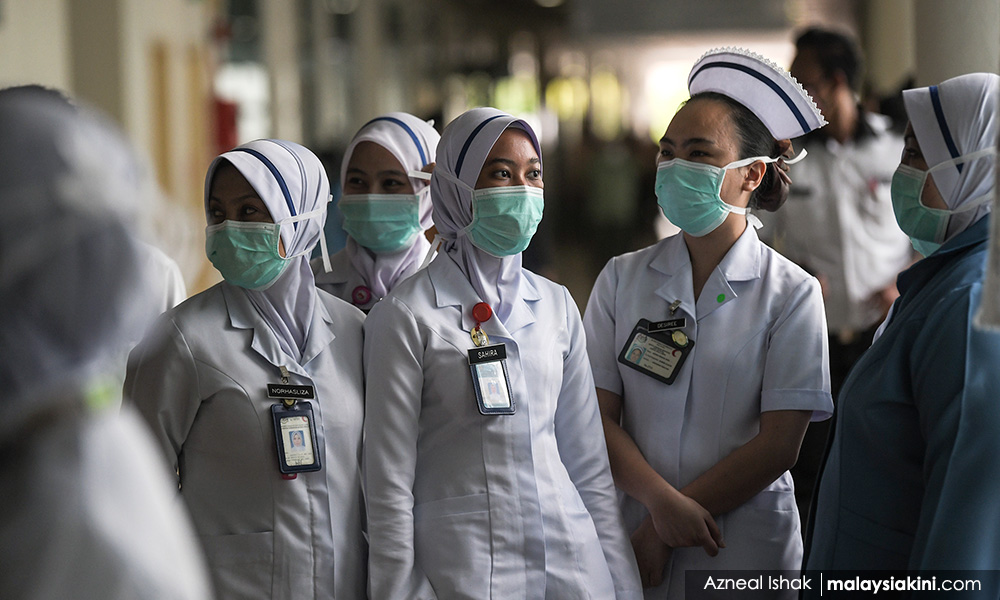
As Covid-19 cases over the year increased, there were sadly fewer personal reported stories. There is an understandable reluctance to discuss death, with grief and pain of loss still raw. In recent history, it was only the tragic deaths from MH370 and MH17 where there has been open collective recognition of those who lost their lives in a national tragedy.
This year’s Covid-19’s courageous warriors deserve recognition. Below, we start a conversation in this direction.
Meet the Covid-19 warriors
Pastor David Cheng from Emmanuel Baptist Church in Kuching was Malaysia’s first Covid warrior to pass away, in March. Members of his congregation spoke of his generosity of spirit, deep sense of caring and warm smile. He was a loving father, husband, friend and spiritual leader.
Former Fifa referee Jaswant Singh Sran, formerly residing in Chow Kit, passed away in May. He was a retired Bukit Aman police officer who refereed football matches involving legends such as Soh Chin Aun and the late R Arumugam during the 70s and 80s. He co-founded the Kuala Lumpur Football Association (KLFA). Friends recall his passion for football, dedication to fairness and pride in civic duty.
Beloved father of Covid survivor Syahira Idris and her sister shared publicly the loss of their father Idris Atan in Kuala Lumpur last March. Bravely calling for prayers and support as he fought the virus, this family was one of the first to share their grief and valiant efforts to fight the pandemic. Not only was their filial love so poignantly expressed, their openness helped to break down some of the stigmas of Covid-19.
Also in the public eye was the death of Special Branch police inspector Mohd Fairos Saberon in April. His friends spoke highly of his dedication to his family and work ethic. Police officers have been on the frontline of this disease and Fairos was the first of the men in blue to fall. His wife was devastated by the loss, she herself a Covid-19 survivor. Fairos was only 36 years old, a beloved husband and father. He left a touching video for his wife: “You’re the last woman I’ve loved.”
Nadila Rahmat was a devoted and caring nurse attached to Sultanah Fatimah Specialist Hospital's orthopaedic ward in Johor. She died after 17 days in the ICU. Her last words were those of a devoted daughter “Please look after mum and dad.” She was only 32. Dong Zong and the Selangor Chinese Assembly Hall (KLSCAH) raised RM65,000 for her family, as she was the first Malaysian frontliner to die of Covid-19.
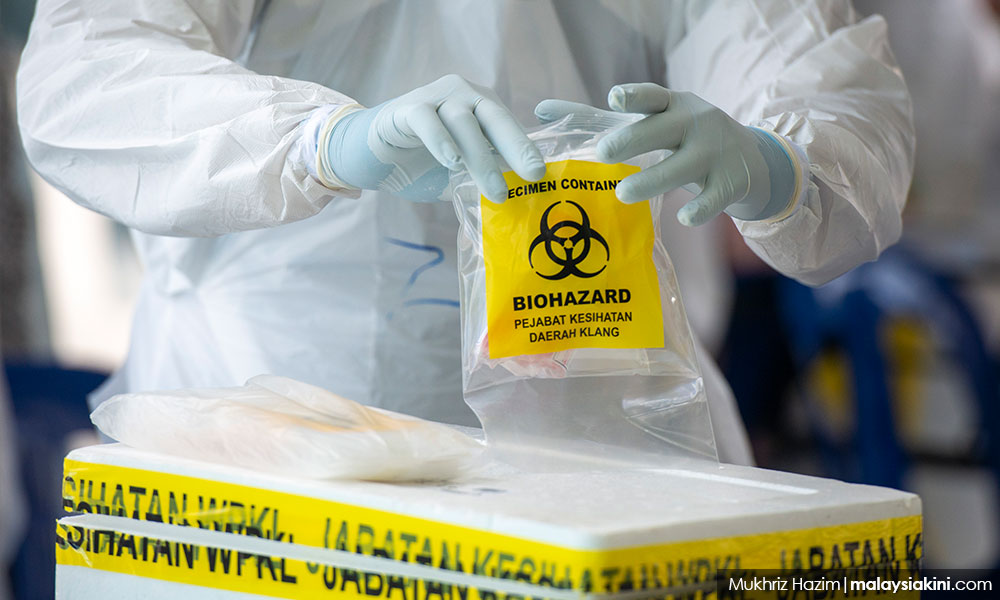
Professor Rahimah Abdul Aziz of Universiti Kebangsaan Malaysia (UKM) passed on after suffering from Covid last month. A professor of sociology, she was among the first batch to join UKM when it was founded. She is remembered fondly by her colleagues, classmates and students. Rahimah is possibly Malaysia’s first patient who has succumbed to the aftereffects of Covid-19.
Top Glove security guard Yamnarayanan Chaudhary Tharu who had lived and worked in Klang for two years, originally from Nepal, died in December. He was known for his ready smile. His family was notified, but due to the outbreak will not be able to receive his remains.
Dr Shree Vishna Rasiah or ‘Vish’ as he was known worked at the Birmingham Women's and Children's NHS Foundation Trust. He died in Birmingham from Covid-19. Originally born in Kuala Lumpur, fluent in Mandarin, Tamil, Malay and English, he was talented neonatologist known for his dedication to the care of babies and their families. He was a beloved husband and father.
Tengku Endut Tengku Jusoh from Terengganu also died overseas from Covid-19 at the Hamad Medical Centre in Doha. He was an engineer working for Qatar Airways, providing for his family in Besut. He leaves behind a loving family who has lost its main breadwinner.
Sabahan preachers Francis Liaw Yuk Yen and his wife, Lily Chin Tsen Yun, died from Covid-19 while on mission in Madagascar. They were deeply committed to their faith and warmly loved by friends and family in Kota Kinabalu.
These public accounts of individuals are coupled with the anonymous deaths. The two babies who died in October and November; the doctors, nurses and medical personnel that make up at least eight of the deaths; the foreign workers listed as ‘non-Malaysians’ dying far from their families that they have come to Malaysia to protect and provide for.
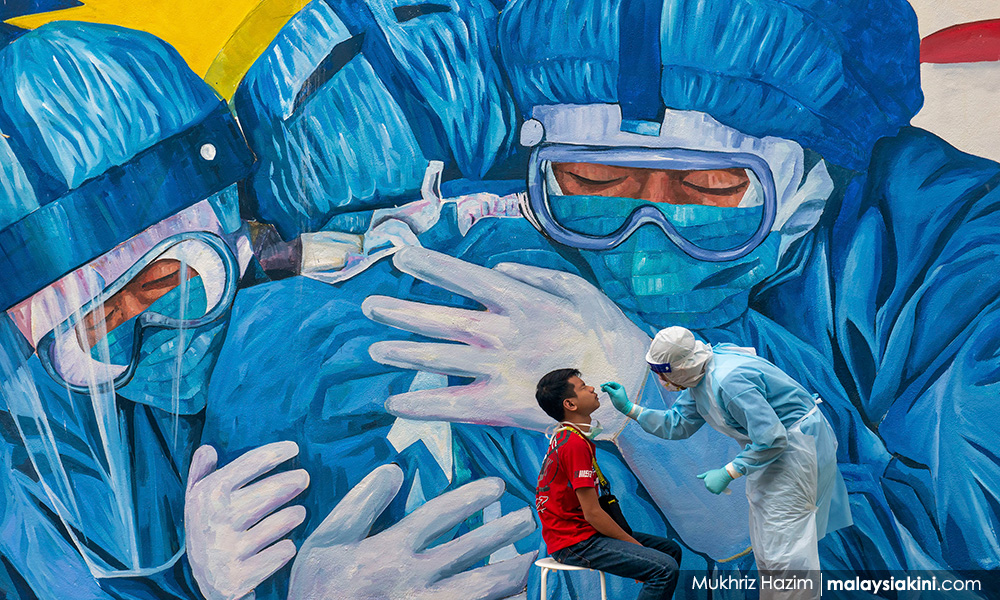
Of all the tragic stories of the year, among the most disturbing for me personally was the ex-security guard who died on the side of the road in Rompin attempting to walk 372 kilometres from Johor to Terengganu to be home with his family - a valiant trek of the human spirit where his body finally gave out.
Examining official Covid-19 deaths
Over the year, we have learned of the passing of doctors, teachers, students, workers, civil servants, professionals, restaurant owners, religious leaders and more. Covid-19 has not discriminated, affecting people from all walks of life.
The Lancet study (between Feb 1 and May 30, 2020) found that of Covid-19 cases disproportionately were male, Malay majority and a comparatively younger cohort than in neighbouring countries. The study found that those with previous medical conditions were among the most severe cases.
Drawing from the publicly reported information about deaths (in which ethnicity is not available) from March to Dec 29, we find similar trends. Males make up the majority of deaths, 65% compared to females at 35%. Older Malaysians are among the majority of Covid-19 deaths, around a third (34%) over 70 years, and a large majority (65%) over 60 years. The most deaths have occurred in the cohort of those in their 60s.
In the official public reports, 76% of those who have died from Covid-19 have pre-existing conditions - with diabetes, high blood pressure, hypertension, stroke, gout and asthma the most common. Of the reported deaths from Covid-19, 32 are not Malaysians, largely foreign workers from Indonesia, Myanmar, Nepal and Bangladesh.
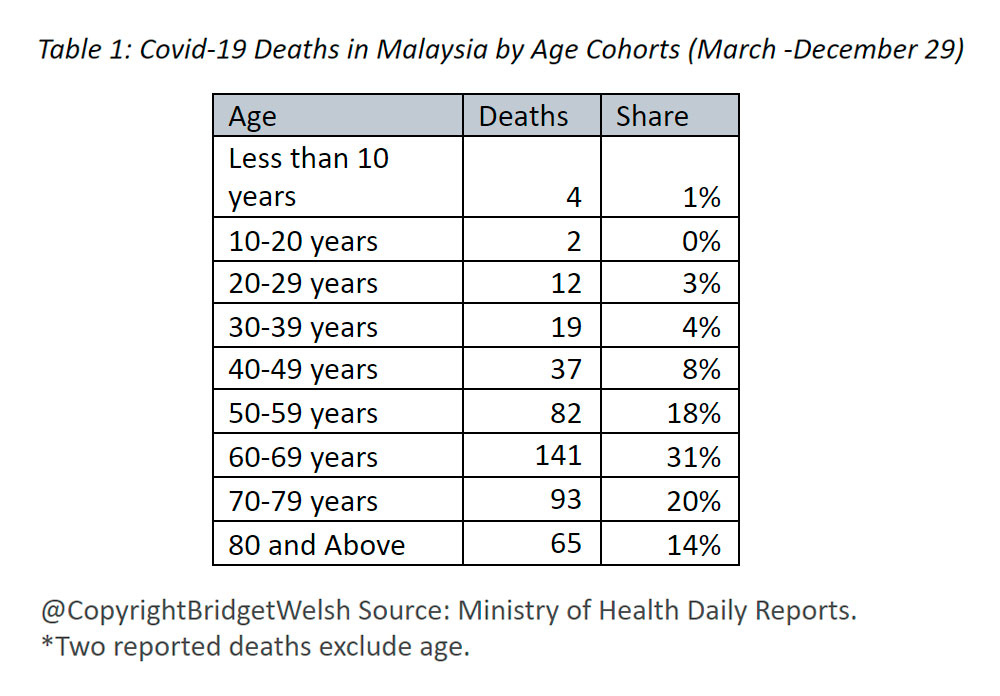
We also find a geographic concentration of the deaths, especially in Sabah. This state has the highest number of cases but also has 57% of the fatalities from Covid-19. The mortality rate is much higher than Selangor and Kuala Lumpur, which also have high numbers of cases but have greater access to healthcare and less poverty. Covid-19 has not spared any region in Malaysia.
Given the increase of cases and the geographic shift of the disease, further research is needed to look more carefully at the evolving composition of those affected. Of special importance is the background of those who died, as the data suggests that socio-economic background, lack of access to health care and malnutrition may also increase the risk of death.
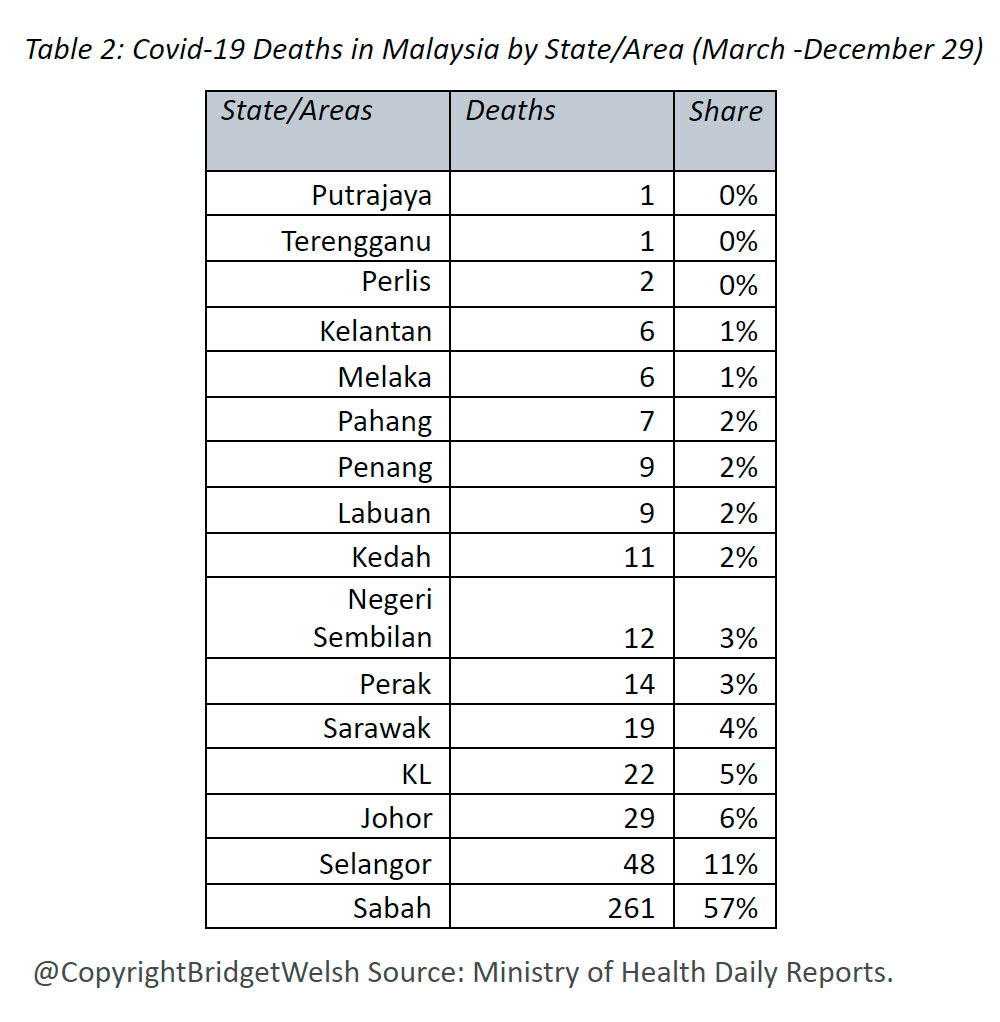
The unreported victims
So far, these numbers have captured those who have become part of the official Covid-19 government statistics. There are others that should be included. These are those who have died from the circumstances that Covid-19 has created. Here, the data is even more challenging.
Among these are the elderly, who out of fear and concerns tied to lockdowns, have not received the food or care for their health that they need. Over the year, news reports describe elderly Malaysians who have died alone, often separated from family and their support networks during these Covid times. Disproportionately these are women.
As important are those who have committed suicide, with the pressure of Covid-19 circumstances taking their toll. Earlier this month, it was reported Consumer Association of Penang (CAP) president Mohideen Abdul Kader traced police statistics and found that 266 people committed suicide between March 18 and Oct 30 this year.
A Malaysiakini study found that 46 migrant workers have committed suicide during the pandemic. Follow-up discussions about these suicides with migrant organisations reveal poignant stories about hardship and hopelessness, in which the anti-migrant xenophobia has contributed to increased mental anguish.
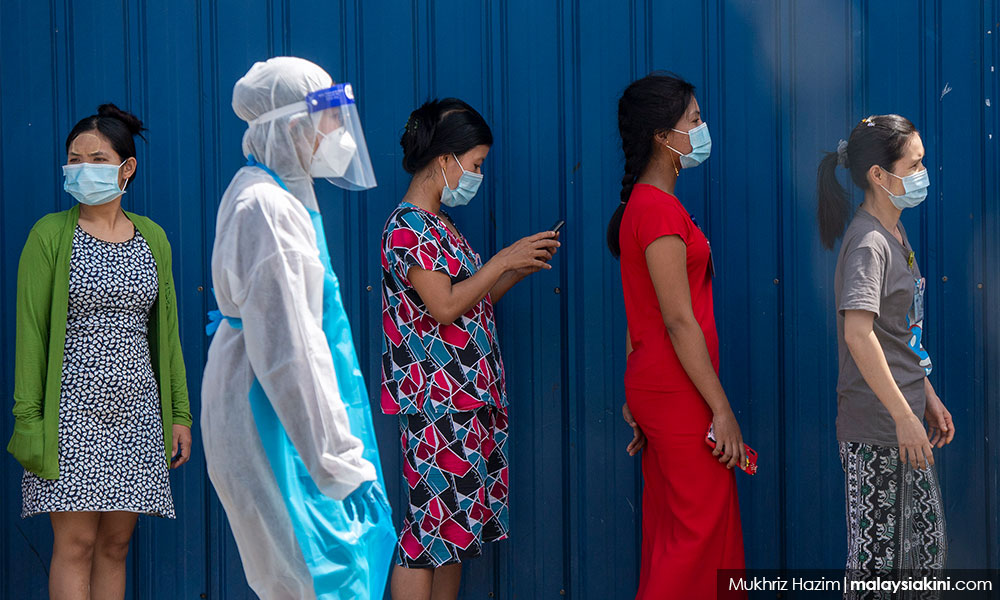
Migrants lack support systems, and as the economy has contracted, jobs lost and conditions worsened, they have been on the frontline of suffering. These individuals, whether trapped inside by fear or distressed in dormitories, are also Covid warriors - but largely unrecognised ones.
Taking a moment
Malaysia, compared to the rest of the world, has been extremely fortunate but this is not the case for all. We know that Covid-19 has affected people differently, with vulnerable communities especially hard hit economically. This different experience extends into mortality.
For every one person who has passed on, there is a network of loved ones left behind. Deaths have also affected some more than others. Some families have lost more than one person. Many have lost their breadwinners. Some have not been able to afford a funeral, with others not able to access their loved ones remains. Only a few states offer (modest) financial support to those affected directly by a Covid-19 loss, and the national budget leaves out these warriors altogether. With death, there is often economic hardship while love ones are grieving.
Covid-19 is not an easy death. It remains stigmatised and deeply isolating. One of the most difficult dimensions is the separation from loved ones in the final days, with goodbyes over messages. Many loved ones have not had closure. Medical personnel across faiths, and often with others of a different faith, have worked to provide solace and peace in the final hours. More often than not, the last touch has been a gloved hand.
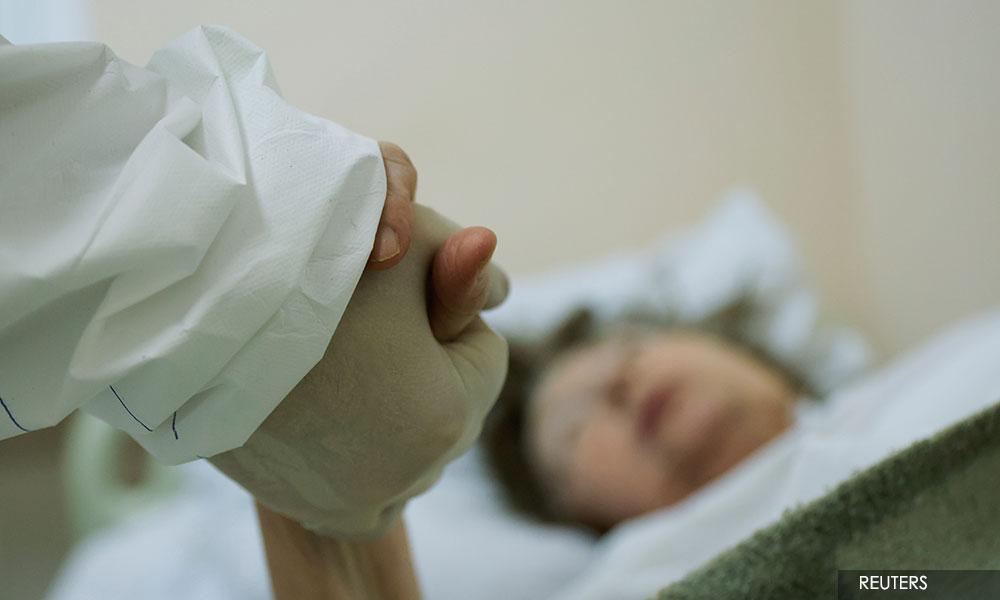
As we reflect on the difficult year of 2020, there have been many heroes in the fight against this pandemic - the medical personnel, other frontliners, the generous givers of food and financial support, to name but a few. The Covid survivors also have shown courage. Yet, it is those that those who lost the battle with Covid and their families who should be recognised, given the dignity they deserve.
Moving forward, greater financial support to loved ones with available counselling and reduction of stigma is needed. Importantly, decriminalising suicide to increase access to mental health and outreach to distressed migrants can further reduce deaths. The mortality numbers show that those who need to be the most careful remain those with pre-existing health conditions.
Small steps in care and caution can go a long way to making the battles for families of deceased Covid warriors easier and to reduce the risk of the pandemic on lives in the future. In making these small steps, we reduce the risks for all of us.
BRIDGET WELSH is a Senior Research Associate at the Hu Fu Centre for East Asia Democratic Studies and a Senior Associate Fellow of The Habibie Centre. She currently is an Honorary Research Associate of the University of Nottingham, Malaysia's Asia Research Institute (Unari) based in Kuala Lumpur. She tweets at @dririshsea.
The views expressed here are those of the author/contributor and do not necessarily represent the views of Malaysiakini.

